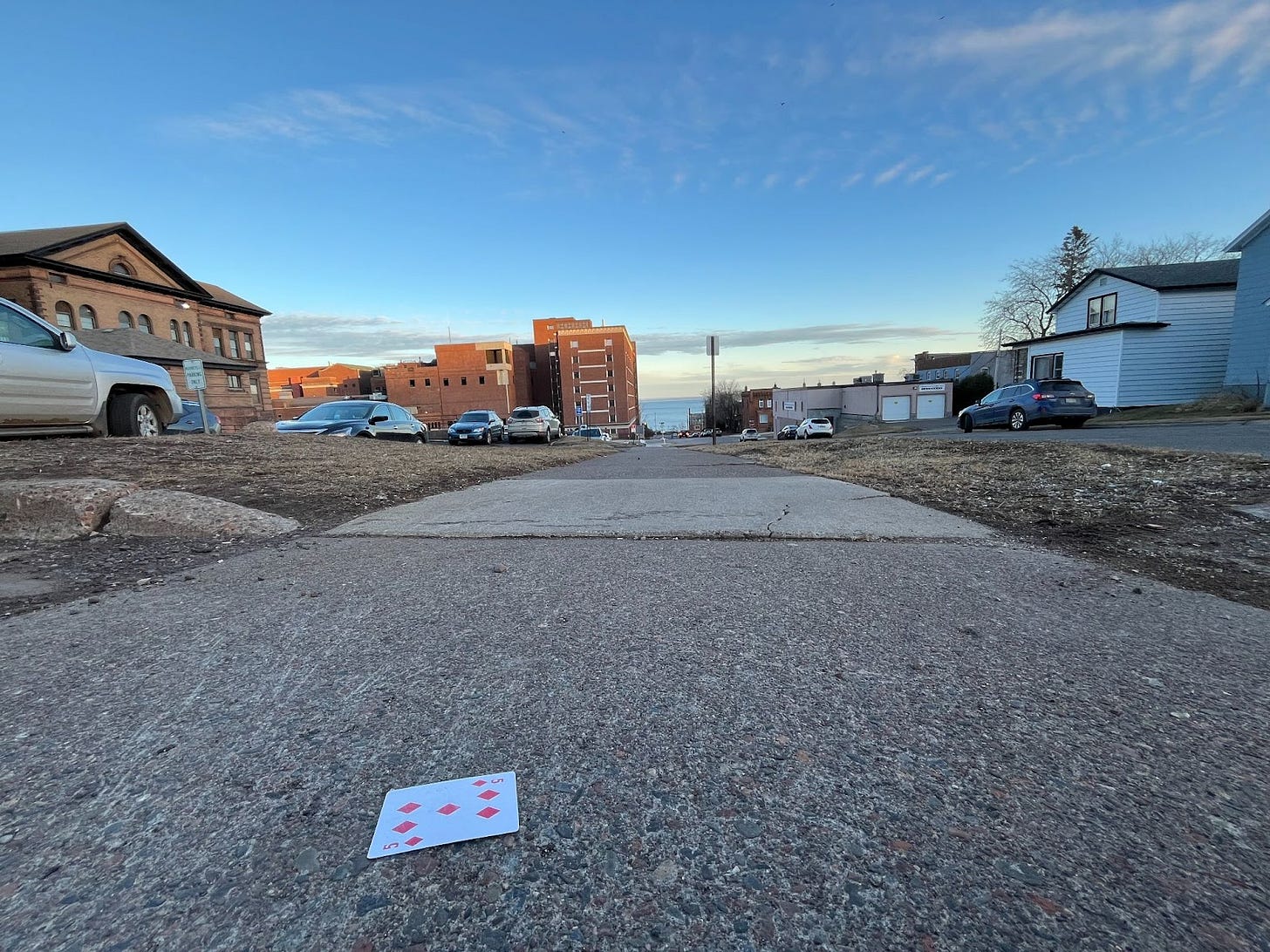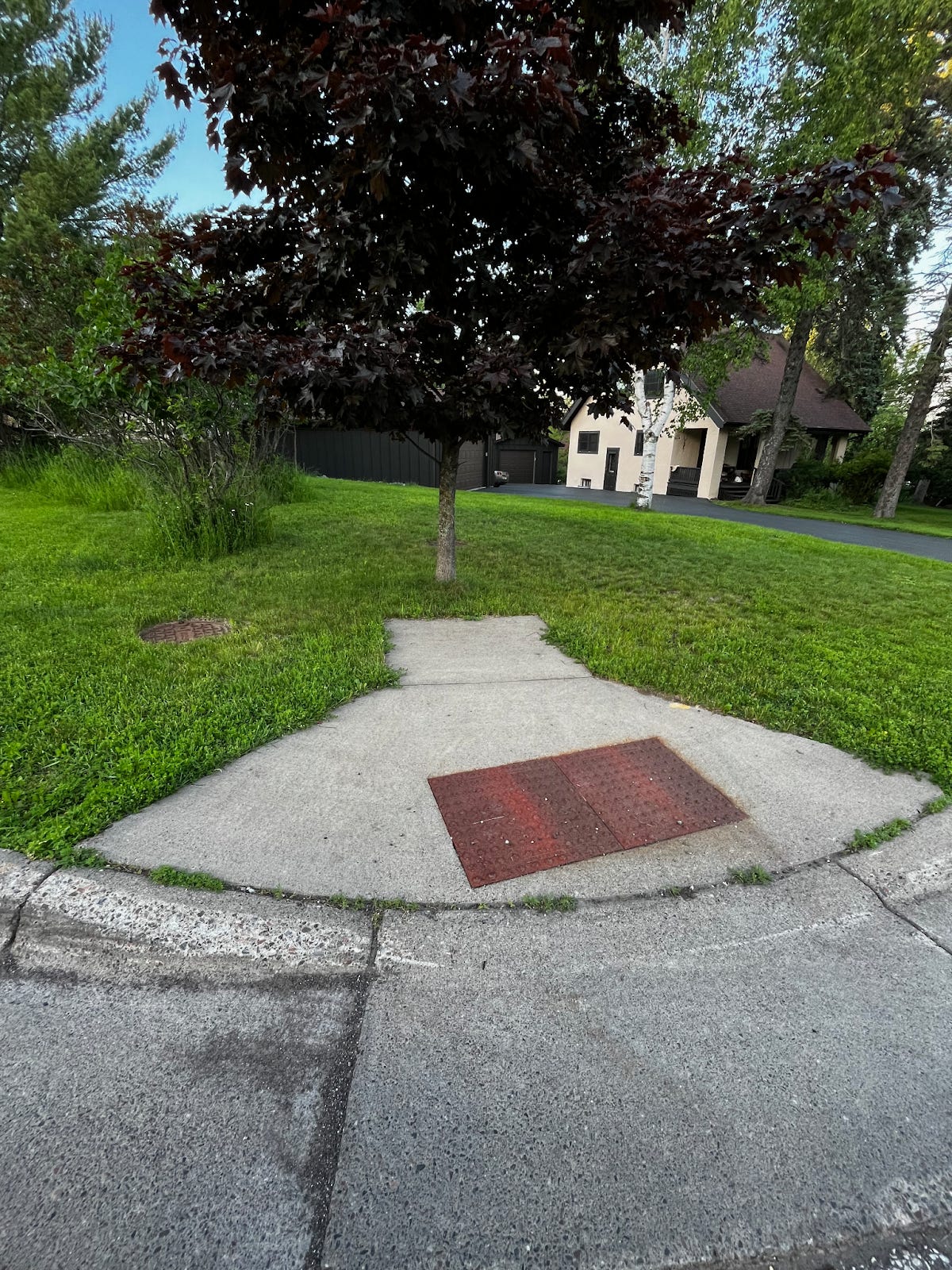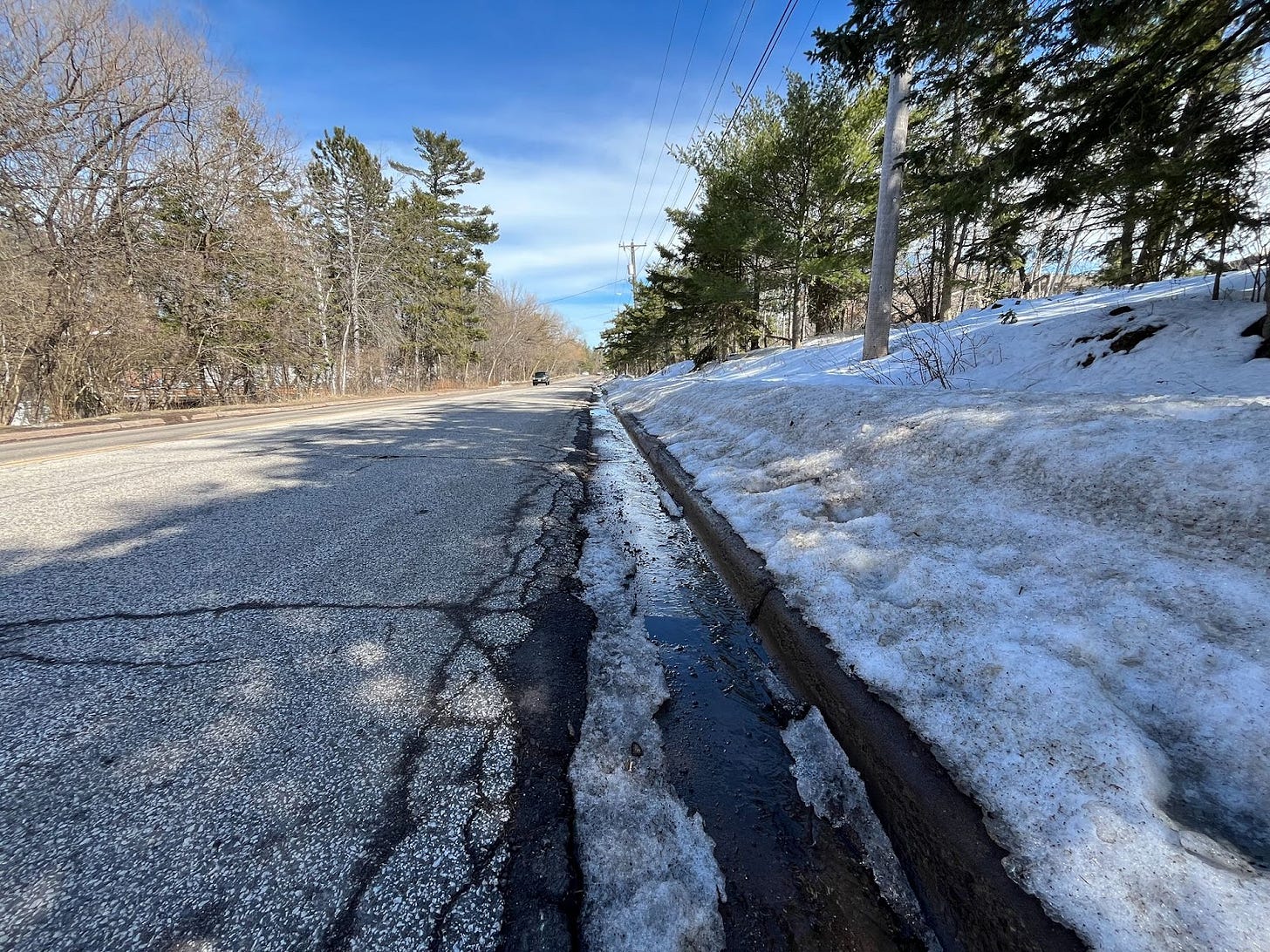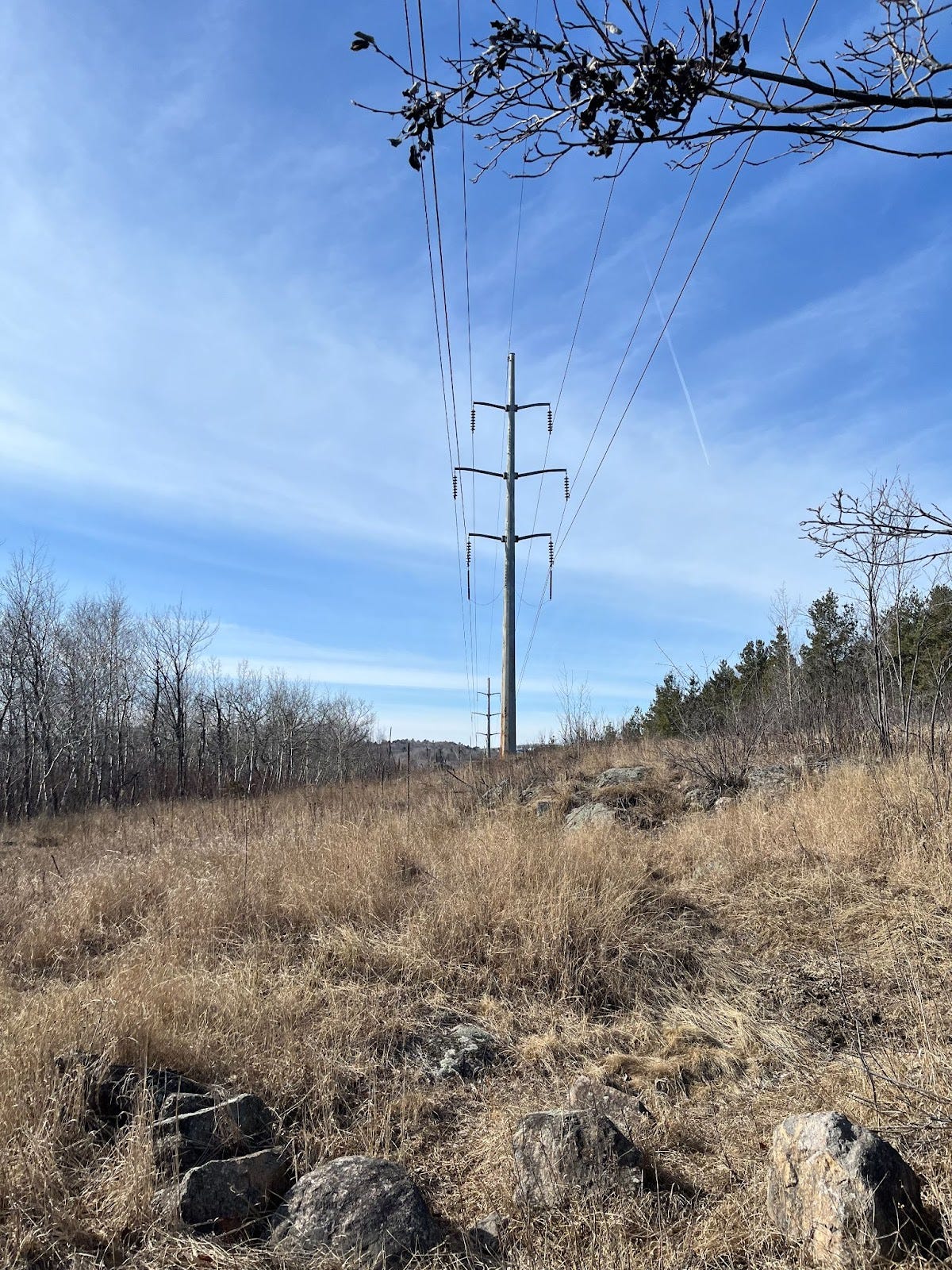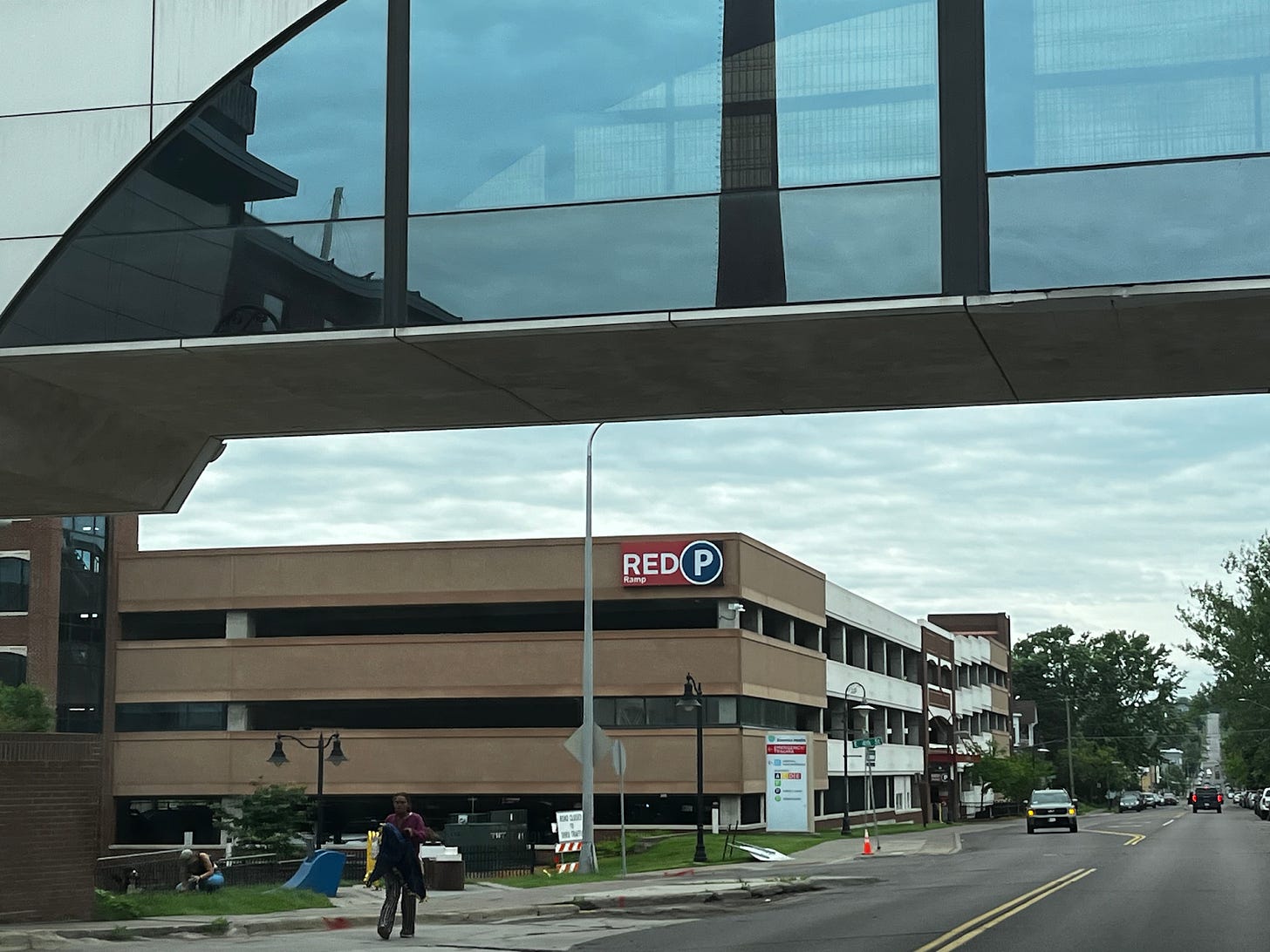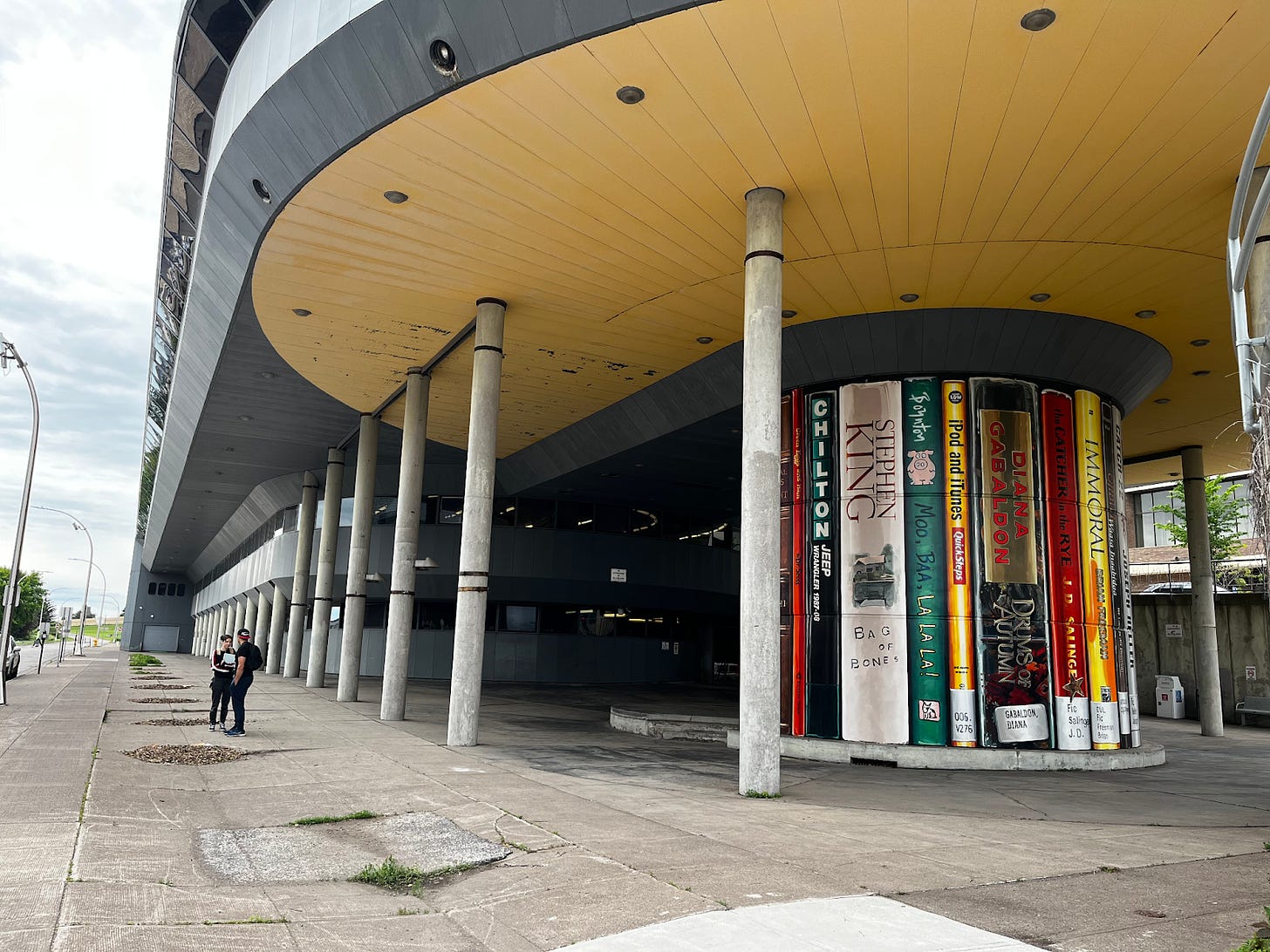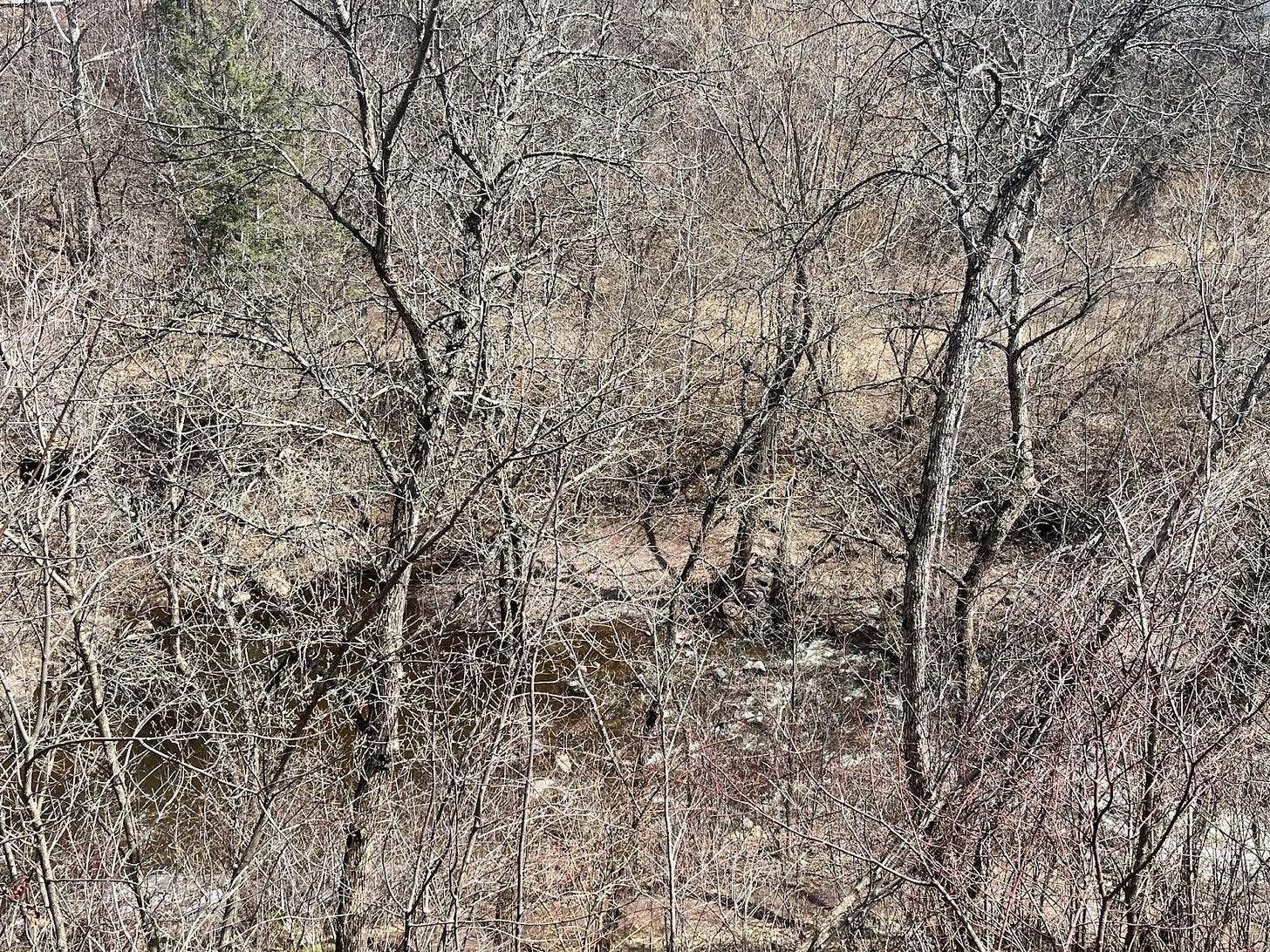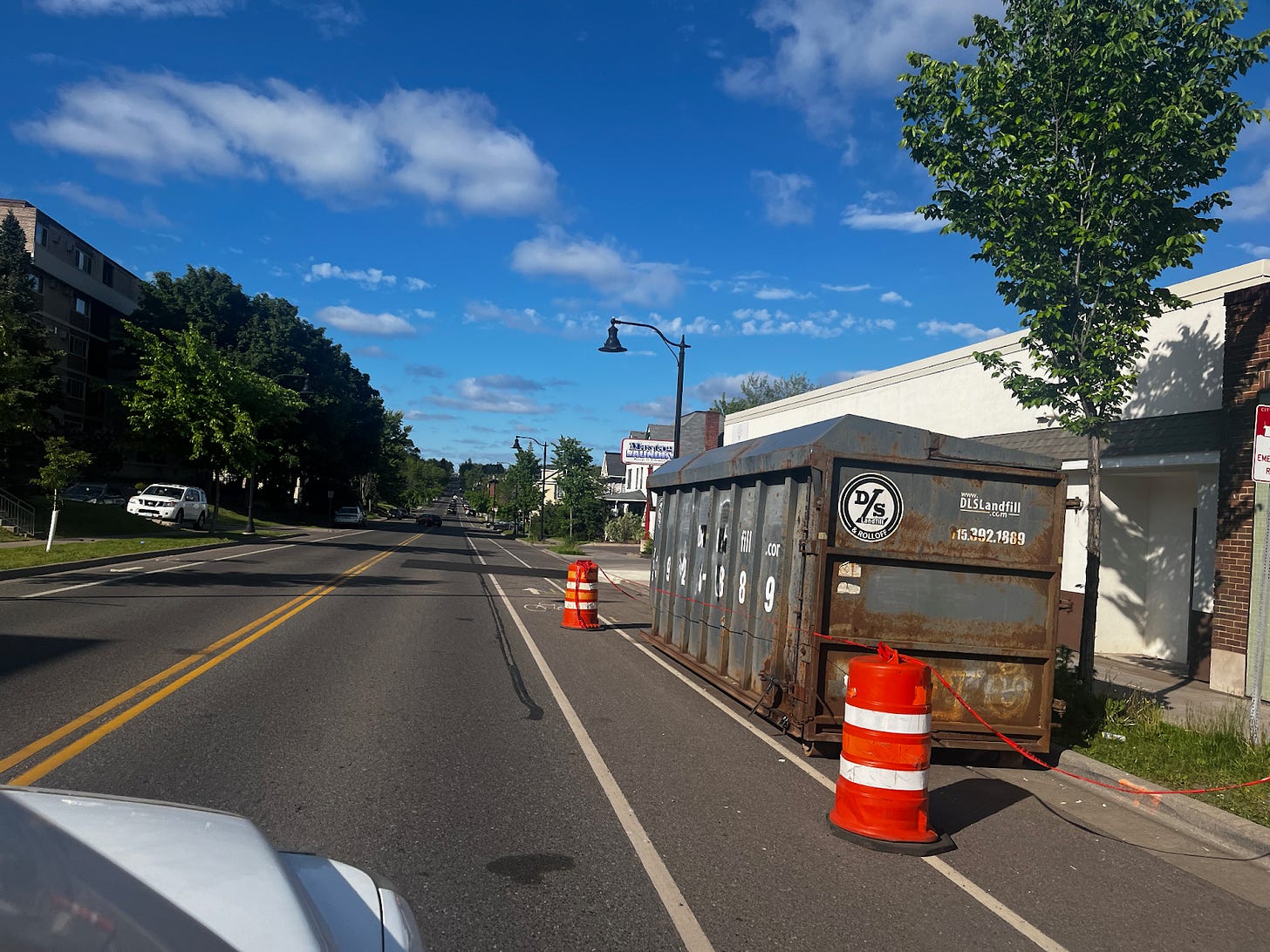Preview: Wasteland Children: Eyes on Duluth
We still exist, even if you don't plan for us. If you set aside space, we'll still have to exist outside it.
By bennett mullozzi, bennett Mullozzi | Linktree + Substack
Joe (my younger brother) recently complained (or rather, proclaimed) to me: “There is nothing that happens here! Nothing to do!” I found this funny, especially his blaming of the “majority old” population of Duluth, so that every venue aims at “old people” in their hours and their services. I don’t think he is right, I’ve seen too many things for that to be the case. But his frustration made some feelings bubble to the surface, and I can see why many people feel that it's so much harder than it needs to be to find their place here.
…
A few years ago, my mother walked me over to the house next door where I was taught to type on a keyboard by Marueen, the elderly lady who had no patience for my slow movements or complaints of pain in my wrists and fingers. Mom told me that she was nice and that I could trust her, but I couldn’t tell what she meant by that. I’m pretty sure just calling someone “nice” doesn’t make them that way. Maybe she meant nice to her. I quit before the home row ever felt at home. I still have a lot of fun quoting the voice clips from the BBC typing program with Joe though.
I floundered in public school for three years, unable to complete handwriting assignments, or sit still, or focus, or read analog clocks, or see the chalkboard, or exist without hurting people or putting them on edge. No one seems to believe me when I say that just because something isn’t an accident, it doesn’t mean that I want it to happen. I sat in the hall with dozens of worksheets while the class watched Paddle to the Sea. I enjoyed the fleeting glimpses I caught of that film before I was reprimanded again for shirking responsibility. The water and colors reminded me of the book Minn of the Mississippi. Everyone seemed to like the movie, but I think that the turtle story is better. Everyone looks at this creature and sees something scary, prone to violence, and thus violence is necessary. The child that shoots off its leg with a bb gun sees his violence as not necessary but gleeful, fun. Here is a scary thing worth hurting, I can revel in my own capacity for violence without doing real harm. It feels like a much better story than a block of wood that has its intent proudly etched into it, that never acts or reacts, and is never misinterpreted and easily understood by the people around it. Anyway.
I dropped out of school, shortly after I fell down the embankment of the fourth street bridge spanning tischer creek. My parents didn’t want me to take the bus for some reason, but the walk home alone was too long, my backpack too heavy, the concrete too sharp on my legs and feet. An idea came to me: “I should ditch the bridge and go underneath it instead!” My dread melted away, my backpack felt lighter. It wasn’t a shortcut by any stretch of my imagination: slooshing down one bank, using the brush and saplings for balance, risking a quick hop over a half frozen river, and scrambling up the other side. It didn’t matter. I knew I could do it, a couple of the older neighborhood boys had showed me how last summer. It felt a thousand times more doable than walking down the same concrete slab that hurt my feet everyday, with the terrifying cars tearing apart the air right beside me, to then turn left and begin the slow steps uphill.
I have spent almost all of my time walking on car roads, as the sidewalks on 33rd and 34th only appear in short bursts. If I wanted to stay “off the street,” I’d have to jaywalk in zigzags at least four times and that route only works when they're shoveled. Plenty of cars honk at me, swerving towards me in their attempt to avoid the worst of the potholes, (or for the teens with new licenses, intentionally running into puddles to splash kids). I don’t care, their annoyance or concern is fleeting, and the asphalt walk is eternal.
Having gotten to the bottom and realized the river had swollen from the freezing and thawing snowfall, I turned around and proceeded to climb back up the ravine, until the slick snow and ice I slid down no longer gave any ground. I spent thirty minutes down there, desperately clawing at dead shoots to pull myself up on my belly. I would get one body length away from the curb and then start sliding back down again. A few kids older than me saw me once the clubs left school, but they were in a rush to get home, and their passing curiosity and confusion was not what I wanted. My embarrassment lasted just a moment after I told them “I’m fine”, expecting them to overstep my boundaries and pick me up. Instead, they looked at me like I was a weirdo and hurried away. I felt suddenly, with absolute certainty that I would die clinging to the side of a hill, probably from starvation. My body would slide down and be claimed by the water, and whatever care and attention I received would be the horror my family felt if my body was recovered before it drifted into the lake and was consumed by it.
The embarrassment came back after I managed to stand and shuffle sideways to the stairs, but it felt muted in the face of the weight of my body and a newfound closeness to death. All three formed into a new feeling, a wakefulness to the fact that the way I was instructed to exist was crushing, but trying to do what felt right was going to put me in danger. Trying to be myself, a creature attacked and misunderstood by the people around it, took me out of the safety net built for the children around me. And there wasn’t anything underneath it.
Unlike the slow starvation I imagined under the bridge, the hurtling wagon's promise of death seemed quick, easily arranged, and not the fault of my own stupidity. If any one of these irritated mom’s or reckless 18 year old’s wanted to kill a kid that bad, so be it. Looking up the hill, I thought often that I didn’t hope for it to happen, but it’d be nice if it did. It’d be like the rare occasions that my mom or our neighbor’s up the street happened to pass in one of the cars, and offered to pick us up and deliver us home. Sweet, random, bliss, just without the deliverance. The closest thing to heaven on earth. I’d heard about the difference between dying and going somewhere and just dying in Sunday School, but in these moments they seemed pretty much identical. At least, I’d prefer them to the pain my legs were expecting. Almost anything beats this dull danger.
My reward for my effort to inject a little more life into my day was a much longer, painful, and wet tromp up that hill. Trying to live without the pain in my existence became a dangerous thought I'd do my best to live without.
Gritting my teeth, my arms and legs splayed after a bad tumble from my skis, I looked into the eyes of the ski patroller I'd fallen at the feet of. I had fallen into the line for the chair lift at Chester bowl. They asked me if I was okay. I said that I was fine, and hoped they’d go away or something would put me out of my embarrassed misery. They gave me that look I’d gotten used to seeing but never understood, and to my suprise went about their business, back onto the chair lift. I wondered to myself if I had hypnotism powers, and if they only worked on the people that were confused and uncomfortable with me. In front of all of them, I contorted my body until my leg fractured with the effort of trying to get up by myself.
…
Later, I would be driven a mile uphill to learn piano from Carol. It was one of a series of activities that my parents could use to fill learning time away from home. I couldn’t grasp sheet music, so I would locate the starting hand position relative to middle C, and then memorize the hand movement patterns for whatever song I needed to learn that week. It was extremely stressful, and I pleaded with my parents many times to let me quit. They insisted I would be grateful to have had the opportunity when I was older, and they were the ones paying for it and bringing me to it, so my vote counted less. I was brought to piano for seven years until I could use the impending transition to a charter high school as an excuse to burn out. I still can’t read sheet music. I try to keep practicing sometimes, but my fingers can’t take it.
…
My mom signed me up for sewing with Sandy to ease the burden of bringing me and my siblings around all day. We would bike up and around hawthorne, skyline, and arrowhead. The other kids we worked with showed us a shortcut that took twenty minutes off the time, but it was still 300 feet uphill on a no-speed bike with a backpack full of cloth in the beating summer sun. Joe and I often got reprimanded for slacking off or getting distracted, singing along to the Frozen soundtrack playing in the background. It almost came as a relief when Sandy told Joe and I that she couldn’t teach boys past the basics because she only knew women's clothing patterns. I knew she was lying, but why would I argue to stay somewhere I wasn’t wanted? To keep making painful bike trips to waste everyone’s time and money? Pass. My mom still likes the rice packs I made, but I can’t remember anything about them. If it wasn’t for the uneven seams, I’d think we bought them somewhere.
…
There were other things. I was brought to dance at Madill’s in West Duluth, took Taekwondo at the YMCA, and went to Hartley nature center for wilderness experience. I did a summer camp at the children’s museum after they moved from the depot to West Duluth. Thinking back, it sounds like I did a lot. But it feels more accurate to say I was voluntold to do things, and only had these opportunities because of financial privilege. This was clear to me the entire time, as my mind remains a cluttered mess. The things I brought myself to were all blips, each too exhausting to ever sustain, but standing out like a flare amongst nothingness. The only things that were constant were the things I did not choose for myself and they all blend together, years of “activities” only separated by the feeling of my body being shuttled to and from my house. I can honestly say my impression of Duluth is a dozen or so little dots, each connected by gray lines. This has improved in recent years, as I have attempted to run or jog as my commute to schools or activities. I have seen some places in between dots, and even some beautiful scenery. I got too burned out to keep it up though.
Walking through many of the suburbs and sidestreets, I feel odd, detached. I feel like I'm floating, and I can’t help but blame the place for my feelings. Trying to move through this place feels wrong, feels odd. You’re meant to fast travel through it, jumping in a wormhole and popping out in the place where you need to be, and then going back to the place you belong. This is the way it has always been for me, but I can’t help but feel that something is wrong.
When my nieces came to visit, they came up with the idea of walking to my partner’s house, because they prefer her company to my own. This by itself isn’t unusual, and so I accompanied them on their “ditching” of me: following 100 feet behind, jogging to catch up occasionally to set off shrieks and panicked footraces. I repeatedly asked if they needed help, but they reveled in the fact that they had crafted a plan, set out to see it through, and were doing just fine, thank you. I remembered how they both have complained that they have nothing to do, since covid they spend all their time out of school at home, in their rooms. Their parents don’t have time or energy to engage with them or drive them places. My mom still has the energy to take them places sometimes, and offered to pay for gymnastics lessons, and outside of that they live their lives online. Without a person to drive them to one of the places they can be checked into, they have nothing to do in the world around them.
An hour later, I had to call my partner to pick us up, as we barely had time left in the night to say a quick hello and get a fifteen minute ride back home for bed. I was attacked for my betrayal of the mission, but there was no other option.
Duluth has always been spread out, but I’ve noticed it has continued efforts to spread people as thinly as possible. How thinly can we be spread before we no longer count each other as neighbors? I only know the names of three of my neighbors, and no one greets me when I say hello beyond a nod if we walk past each other, or a frown if they’re driving.
Here are the current problems as a result of our history:
As someone with lifetime experience as a child in Duluth, through every stage of development, I can attest to our failure.
I’ve lived in the Congdon neighborhood and spent high school in the city center. I’ve tried to move through independent means and I’ve relied on cars, buses, and other community based means.
I’ve had to weave my way through side streets, the underground and skywalk entrances, and the back doors leading through the belly of the main library. There is the prevailing feeling that existing there is forbidden (an intoxicating feeling for most teenagers). As a child I laid on a picnic blanket on the hard concrete for the kaleidoscope events. Starting in a place of discomfort and the stone growing warm from the crowd of a soft one-hundred gathered to listen to the Okee-Dokee Brothers. I went to the same spot a decade later to hang out with friends: listening to bad fanfiction podcasts and stealing bad shows from Netflix. It felt a lot more miserable. It was just the four of us, and an unrelentingly cold stone. A guy came over to offer us a hit. This must be that Minnesota Nice I’ve heard so much about. The places for us to go are strung out little blips along the cityscape, and once we became adolescents I realized they had the hallmarks of a gated community. Most playgrounds, nurseries, or daycares are fenced in, and require an adult to sign in and out to access (and they're all for a very specific age of kid). Public parks are lovely and their “open hours” are the least strictly enforced, but almost never provide the need for privacy or shelter.
Anti-human seating and intentionally ineffective gazebos keep it as a nice weather only option, and they often require a vehicle to get to. Many have public bathrooms or other buildings that have roofs, but all of them are liable to be locked up with no notice. They could stay that way for a night, or a week, or a season. I wouldn’t know, I just know that every time I am capable of getting there they are locked. The teenspace of the library was in the same section as the child one. I avoided it until it was clear it was my only option if I wanted to be out of the street and not have to worry about security sweeps, angry strangers, or other people with nowhere to go that I was scared to talk to. I know that because we didn’t have safe homes to hang out in, didn’t have cars to drive to isolated forests or fields, didn’t have the money or means to do anything safe, we were forced to make unsafe choices in uncomfortable public spaces. I’m glad I got that experience, as ashamed as I am, because it helped me learn how to feel when I see someone and can’t imagine the circumstances that make their current actions make sense. The library staff made reasonable accommodations to this situation by moving the teen zone to the opposite side of the library, similarly to how the adult section is on the second floor and the children friendly section is on the ground level. Anyone can go to any section, but they are intentionally designed to provide what is needed for different people, and unwanted activities are discouraged. The teenspace is within eyeshot of the front desk, the underbelly stage is now full of cameras. But now where do we go? Where do they go?
Unless I go to one of these zones, children cease to exist. I was convinced that my generation was the last group of kids in my neighborhood, until teenagers seemed to appear among the rows of houses years later. Where do they go?
Our places for children are designed as impermeable bubbles where a parent with access to a car places a child temporarily, existing in contrast to the city around it. The city is designed for adults who can consume and engage economically, and to be uncomfortable for everyone else.
People are often embarrassed when they rely on others in the world we have made. I have heard people complain many times that it is the peak of rudeness for a person to make their child “everyone else’s problem”, and it seems like many parents agree. I see kids reprimanded for talking to anyone in any public place, for making noise, for moving too much. This is saying nothing about if a child asks for assistance from a stranger, even less for the times I have seen a parent tied up by something urgent and have to ask someone nearby for assistance. Holding onto this ancient, outmoded tradition of a community where strangers – those super-predatorial beings –could be expected to occupy space in your world initiates apologetic behavior. I don’t know what emotion I carry alongside the memory of being in a starbucks at 7am, watching a mom cry a little at me because I told her I could play with her toddler while she ran back outside to take a call for a job interview.
My parents always told us that if we were in a public space and needed help, and they were nowhere to be found, that we should look for a young woman with kids, who we could ask to call home.
Finally, there came a day when mom went to the laundromat, leaving us to wait in the car. Joe got bored (after what seemed to us like six hours), so he said he’d go inside to be with mom. She eventually finished, and you can believe that everyone with an attentional deficiency didn’t realize until she loaded up the car and drove all the way home that something was missing. Joe had been watching the Pacman/Galaga arcade game, but when he realized he was alone, he did his best not to panic. He approached the only woman with kids in the building and explained the situation, and asked if he could use her phone. And she said “No.” He said she gave him a suspicious look, like she was wary the six year old was going to steal her phone. We tried not to bother strangers with our existence after that.
We have been told that each person is an individual with many personal freedoms, and indeed, in a world like that, we are inconveniencing others when we ask something of them. We are asking for them to ‘opt in’ to participating in community with us. And they can say no. They can say nothing, because not engaging is the default.
I was walking down second street yesterday and multiple people approached me or offered words as I passed by. Due to my inexperience, my social insecurity, my discomfort with my existence in my own hometown, every interaction felt suspect. I could not register the words that were spoken. I could not see the faces of my neighbors. I did what my father had taught me, what my body does on its own without my control now: I just avoided eye contact, dissociated, and did not return words. Sometimes I come out of Fight, Flight, or Freeze soon enough to realize what they said to me, but never soon enough to respond. My face feels hot thinking about the number of times someone has wished me good morning, or said I looked nice, or asked how I was feeling, and they were met with a blank face, evasive eyes, and a quick walk right by. But for every dozen people like that, it feels like there is the one person who might have been trying to fight me, the one person who might have been trying to bait me, the person who called me a fag, the two people that harassed me, and the six people I still don’t understand and was too embarrassed and stressed to ask them to repeat themselves a third time. I butchered a joke so badly for one poor guy I don’t think he’ll ever tell a stranger they “dropped their pocket” again.
When I told my brother about this he told me we should start going to the gym again. He was surprised when I told him that wasn’t my point. I don’t want to strive to be more capable of violence, to send the message to others I see that I’m not a person that should be messed with, in the hopes that this might increase my confidence and ability to engage. I want to get better and more confident at engaging in my community, and that’s typically easier when you aren’t brandishing a gun or treating everyone like a prospective threat. I am given dozens of chances to engage in my community, and I am so conditioned to expect the worst I can’t handle our best. My emotional reactions discourage others from trying to be friendly in the future. When I act like an NPC, a robot in my community, we all see less of humanity.
These behaviors didn’t come from nowhere. I live in a neighborhood that is enclosed on two sides. The people who own houses in my neighborhood wanted it to feel nicer, and stopped plans to develop the streets in favor of keeping the woods surrounding it. They wanted to preserve the value of their homes, and this goes hand in hand with making it less accessible. There used to be an easier way out on the main street connection: a bus route that took fourth street all the way to my house, but it disappeared before I was old enough to use it myself.



